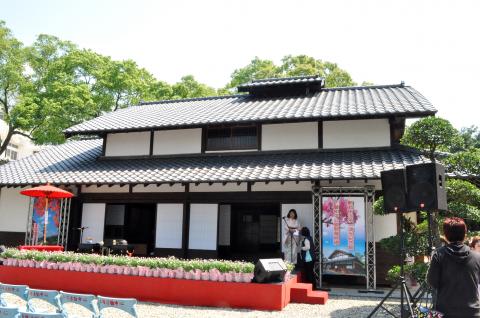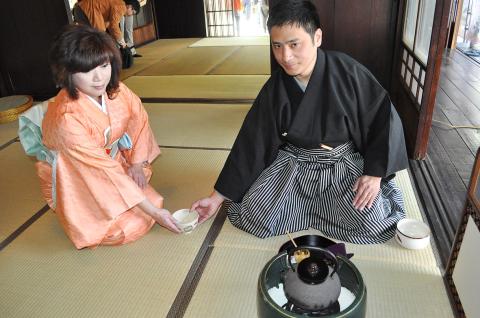The Drop of Water Memorial Hall near Huwei Fort in New Taipei City’s Tamsui District opened last Tuesday. This modest-looking Japanese-style building is a century-old construction donated to Taiwan by Japanese civic groups. Behind it is a touching story. Each roof tile and beam of the building was shipped from Japan and reassembled in Tamsui. Its reconstruction is aimed at soothing the pain of Taiwan’s 921 Earthquake and commemorating the friendship that has formed between Taiwan and Japan during times of distress in both countries.
When the Great Hanshin Earthquake struck Japan on Jan. 17, 1995, several Taiwanese civil groups formed rescue teams to help the stricken areas. These efforts left a deep impression on the grateful residents of one of the hardest-hit areas, the Mikura neighborhood of Kobe City. Over time, and guided by local leader Yasuzou Tanaka, Mikura residents slowly rebuilt their homeland and recovered from the disaster.
When the 921 Earthquake struck Taiwan in 1999, Tanaka led a group of people from the Mikura neighborhood to Taiwan to reciprocate Taiwan’s earlier assistance by helping Taiwanese disaster victims. Since then, Taiwan and Japan have built up a solid mutual help partnership.

PHOTO: TSAI PAI-LING, LIBERTY TIMES
照片:自由時報記者蔡百靈
An almost century-old building in Japan’s Fukui Prefecture survived the Great Hanshin Earthquake without even a scratch, but a few years later it was in line to be demolished. Its owner decided to save it by donating it to the Mikura neighborhood.
When Tanaka and a team of volunteer workers started to dismantle the old house, he discovered that it was built by Kakuji Mizukami, father of eminent writer Tsutomu Mizukami. In view of the house’s historic value, he decided to donate it to Taiwan. This gesture was meant to symbolize homeland reconstruction and encourage 921 Earthquake victims to pick themselves up after the disaster, and as a token of the mutual sentiment between Taiwanese and Japanese people.
The whole house was built using mortise and tenon joints instead of nails. Seven years ago, voluntary workers from both countries dismantled the house bit by bit and put a serial number on each part before shipping it to Taiwan. The house was rebuilt near Huwei Fort in Tamsui and renamed the Drop of Water Memorial Hall, referring to the motto “a drop of water has unlimited possibilities” that Tsutomu Mizukami wrote to encourage poor students.

PHOTO: TSAI PAI-LING, LIBERTY TIMES
照片:自由時報記者蔡百靈
The Drop of Water Memorial Hall, which was inaugurated by New Taipei City Mayor Eric Chu and a representative from the Japan Interchange Association, is open to the public free of charge. The hall houses exhibits showing how it was built, dismantled and built again, as well as aspects of the Japanese lifestyle and some of Tsutomu Mizukami’s writings. It can also be booked for other exhibitions and performances.
Masami Tanabe, deputy director of the Japan Interchange Association, says the Drop of Water Memorial Hall pays witness to the warmth between people in times of distress, and he says he has been very touched by Taiwanese people’s help at this time, when Japan is suffering from another disaster.
(LIBERTY TIMES, TRANSLATED BY TAIJING WU)
位於新北市淡水區滬尾砲台旁的「一滴水紀念館」上週二開幕。這棟外表看似不起眼的日式建築,是日本民間捐贈給台灣的百年古宅。背後有著一段感人故事,古宅一瓦一木都是由日本運來,在淡水組裝重建,以緩和台灣九二一大地震造成的傷痛,並紀念台灣與日本患難中見真情的友誼。
西元一九九五年一月十七日,日本發生「阪神大地震」。當時台灣民間組成許多救難隊前往救援,讓受創嚴重的「御藏社區」民眾銘謝在心,御藏社區在領導人田中保三帶領下,慢慢重建復原家園。
一九九九年台灣發生九二一大地震後,田中保三也帶領御藏社區居民,以回報的心情來台救災,台日雙方因此建立深厚的互助情誼。
在阪神大地震中,福井縣一棟近百年古宅竟然絲毫未傷,但在幾年前卻面臨被拆除的命運,屋主於是決定將這間古宅捐給「御藏社區」,使其重生。
田中保三召集志工拆解古宅後發現,這棟建築是一九一五年日本文豪水上勉的父親水上覺治所建造。由於這棟建築深具歷史價值,因此決定將它送給台灣,不僅有「重建家園」的象徵意義,鼓勵台灣自九二一震災中站起來,也代表兩國人民間的共同情感。
這棟日式古宅完全沒有用到一根鋼釘、全用「榫頭」工法建造。七年前,兩國志工將古宅逐步拆解、編號後運到台灣,在淡水滬尾砲台旁進行重建,並以水上勉曾經用來鼓勵窮學生的「一滴水脈中有無限可能」,將古宅命名為「一滴水紀念館」。
「一滴水紀念館」上週二由新北市長朱立倫及日本交流協會代表共同揭幕,開幕後提供一般民眾免費參觀,內部設有展覽室介紹移築過程及建築工法,同時也展示日本居家生活風貌、水上勉作品等,並定期舉辦展演活動。
日本交流協會副代表田邊正美說,「一滴水紀念館」見證災難中人情的溫暖,現在日本遭逢震災,日本人又再度感受到台灣的溫暖,內心相當感動。
(自由時報記者蔡百靈)

South Korea’s famous kimchi is falling victim to climate change, with scientists, farmers and manufacturers saying the quality and quantity of the napa cabbage that is pickled to make the ubiquitous dish is suffering due to rising temperatures. Napa cabbage thrives in cooler climates, and is usually planted in mountainous regions where temperatures during the key growing summer season once rarely rose above 25 degrees Celsius. Studies show that warmer weather brought about by climate change is now threatening these crops, so much so that South Korea might not be able to grow napa cabbage one day due to the intensifying heat. “We

It’s widely recognized that there are far more right-handed people than left-handed people in the world. Being right-handed simply means preferring to use one’s right hand for tasks that involve only one hand, such as writing and eating. But have you ever wondered about the possible reasons behind the global dominance of the right hand over the left? As with many complex biological questions, multiple factors appear to be at play. First, one reason seems to be genetics. __1__ Therefore, the global dominance of right-handedness is something that has been passed down through many generations of humans. Next,

On blazing hot summer days, fresh ingredients and cool refreshments straight from a refrigerator feel like nothing short of a miracle. However, chilled foods didn’t begin with modern refrigerators. In fact, the origin of refrigeration precedes the invention of this now-indispensable appliance by centuries. Initially, the quest for refrigeration was motivated more by the desire to cool beverages than to preserve food. The ancient Greeks and Romans, for instance, used snow stored in insulated pits to chill wine. Around the fourth century BC, the Persians made a significant stride in refrigeration techniques when they devised the yakhchal. Fashioned from

Continued from yesterday(延續自昨日) https://www.taipeitimes.com/News/lang Finally, cultural influence also plays a role in which hand people prefer. Historically, items that require physical manipulation have been designed for right-handed use. For example, tools like scissors and musical instruments are often constructed with right-handers in mind, making it difficult for left-handers to use them. __4__ While these factors offer some explanation, they remain speculative. The precise reasons for the global prevalence of right-handed people continue to be debated. Nevertheless, left-handedness will remain a phenomenon of great curiosity among scientists and researchers for many years to come. 最後,文化影響也在人們偏好哪一隻手上扮演一角。歷史上,需要用到肢體操作的物品都被設計來供右手使用。舉例來說,像是剪刀、樂器等工具常常就是考慮到右撇子而打造的,造成左撇子難以使用這些工具。因此,許多天生就是左撇子的人可能就必須透過學習使用右手來適應。 雖然這些因素都提供了一些解釋,但它們仍是推測而已。全球右撇子如此普及,確切的原因仍持續被爭論著。不過,在未來的許多年裡,左撇子依然會是科學家和研究人員相當好奇的一個現象。 What Did You Learn? (A) Specifically, different areas of